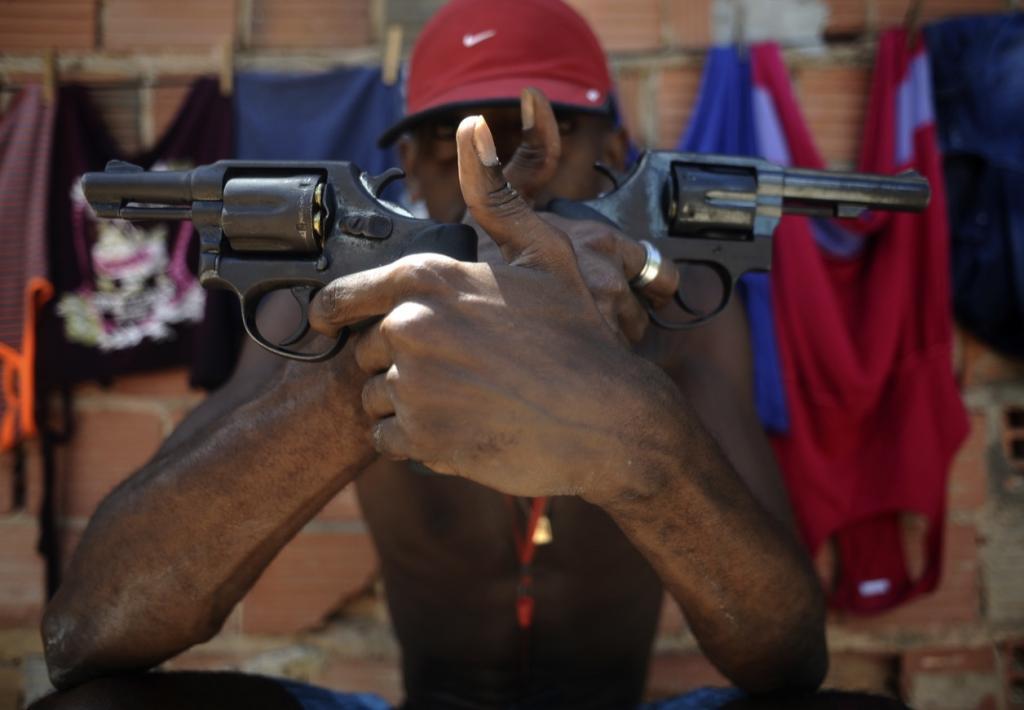In Brazil, where the homicide rate is five times that of the US, a new push to relax gun laws.
A Brazilian drug gang member nicknamed Pilintra, 26, poses with guns in Salvador.
Here in Brazil, where the homicide rate is five times higher than in the United States, politicians are debating a law to make it easier for residents, including convicted criminals, to buy guns.
A group of conservative lawmakers wants to allow Brazilians to buy up to nine guns a year. The bill would also lower the age at which a gun can be bought from 25 to 21, and extend permits from three to 10 years.
Currently, Brazilians are allowed to own two guns and have to register each one. In general, licenses only allow the owner to keep the gun inside their home or office. Guns cannot be carried legally in public at all, with a few exceptions like subsistence hunters and public safety or army personnel.
But even with those tougher restrictions, introduced in 2003, murders are still out of control. And illegal weapons purchases are, too.
According to the Mapa da Violencia report, there were more than 42,400 firearm killings nationwide in 2012, the latest complete figures available. That’s the country’s highest gun-related death toll yet.
In 2012, there were eight guns per 100 people in Brazil, according to a study by the Washington Post. That's compared to 88.8 guns per 100 people in the US the same year, but it’s not exactly low. Brazil ranked 75th for firearms per capita out of the 178 countries the Post studied, using data from the United Nations Office on Drugs and Crime and nonprofit research group Small Arms Survey.
Legislators pushing for the new law say it would enable people to protect themselves in a country with 19 of the world’s most dangerous cities.
But what do everyday Brazilians think about arming citizens in the fight against crime? Do they want to buy guns themselves? And do they think they’ll be safer if everyone is packing heat?
GlobalPost interviewed residents of Rio de Janeiro’s largest poor “favela” neighborhood, Rocinha, to find out. While not considered the most dangerous favela in the country, Rocinha sees its share of gun violence.
Not one person we talked to thinks a more relaxed gun law is a good idea.
Like this group of young guys in a park practicing capoeira, the Brazilian dance-martial art form. (They include 19-year-old Gustavo Gomes, 18-year-old Fabricio Sabino, 16-year-old Luan Kuna Joaquim and 17-year-old Julio Cesar.)
“People will have their guns and they’ll just say ‘There’s a black guy, he’s gonna try and rob me’ and they’ll shoot at us.”
It isn’t just young people who are against the reform. Fifty-eight-year-old Neusa Basilio, who founded and runs the Rocinha Guest House, also thinks more guns on the streets is an awful idea.
She said there are already too many guns, and she couldn’t believe lawmakers want to make it even easier to buy one.
“It’ll just be killing and killing.”
Families are also worried, like 39-year-old Marilda Ferreira and her son, 20-year-old Felipe, and 8-year-old daughter Alessandra.
Ferreira sells souvenirs to tourists passing through the favela. She worries about how safe her kids will be if Brazil passes the law in an attempt to emulate the US.
It’s notable that Brazil’s new law, which would lower the age for gun ownership from 25 to 21, would still be far stricter than federal laws in the US. United States rules vary from state to state, but there’s no federal age limit for owning long guns like a rifle, though you have to be 18 to legally own a handgun.
“You always see, in the US, kids killing kids.”
For young black people in Brazil, the proposed law has an even murkier element. Black men are disproportionately killed on the streets, as GlobalPost reported last month. With more guns and more bullets, several favela residents said things are going to get unbearable for them, like 21-year-old hairstylist Roger Fernando Borges:
“I think the law is absurd.”
